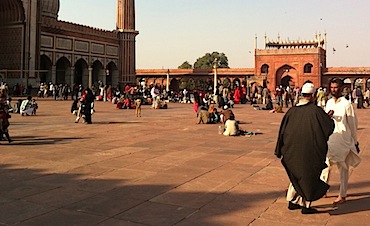The Camel

Somewhere in the Muslim world, a stranger walks into a mosque and seeks out the imam. He has come with questions for about the Qu’ran’s teaching on various topics. He wants to know what the Qu’ran says about the prophet Isa (Jesus) and the Injil (New Testament). He has questions about the prophet Mohammed, and what Qu’ran says about salvation.
He hasn’t come to dispute or to criticize Islam, but to enquire and allow his questions to speak for themselves.
The imam is happy to discuss with the visitor and a group of worshippers gather around to listen and to join in.
The stranger asks the imam to read a passage in the Qu’ran (Sura 3:42-55) so they can discuss it together. From the Qu’ran they learn three things about Isa:
1. Isa is holy: There describes Isa as the word of Allah (God), he is the Ruhullah (Spirit of God), he is the Messiah whose name means Savior. He is righteous and born of a virgin.
2. Isa is powerful: He gave sight to the blind, healed lepers and raised the dead. It is a Muslim’s duty to Allah to obey Isa. To know what Isa has told us to do, we must read the Injil.
3. Isa knows the way to heaven: Allah raised Jesus to himself. Isa is in heaven and knows the way to heaven. Those who follow Isa are above those who disbelieve.
Eventually the stranger leaves, but invites anyone would like to talk more they can find him in the local tea shop.
He leaves the mosque, walks to the tea shop, orders some tea, and waits. Anyone who follows him to the tea shop to talk more may be a person of peace—someone who is responsive and a doorway into a community of relationships.
One of the men who listened intently to the discussion leaves the mosque, crosses the road and sits down to talk with the stranger in tea shop. They talk about Isa as they drink their tea. Finally the stranger needs to go, but he would like to talk more later. He asks if he can visit his new Muslim friend in his home, and meet his family and his friends, and talk more about Isa and what the Injil says about him.
This "Camel method" is a simple way of connecting with Muslims in their world. No Muslim will begin following Jesus because he has lost a theological argument. The purpose of the approach is not to win a debate, but to find responsive people in whom God is at work.
An effective connect approach puts us in touch with a wide range of people quickly, and enables us to identify possible “people of peace” who welcome the messenger and the message and are bridges into a community.
Notice how the stranger moves quickly from the crowd, to the responsive person, then from that person to their relational world. If the gospel is received with faith, it will be a natural next step to form disciple-making groups in the local community along relational ties.
The role of the messenger is not to relocate these new believers into an existing Christian environment. That will only alienate them from their community, and stifle the spread of the gospel. The messenger must help these new disciples learn how to follow Jesus, and make disciples in their world.
This is a story that is being repeated around the world. Here's where you can learn more.
